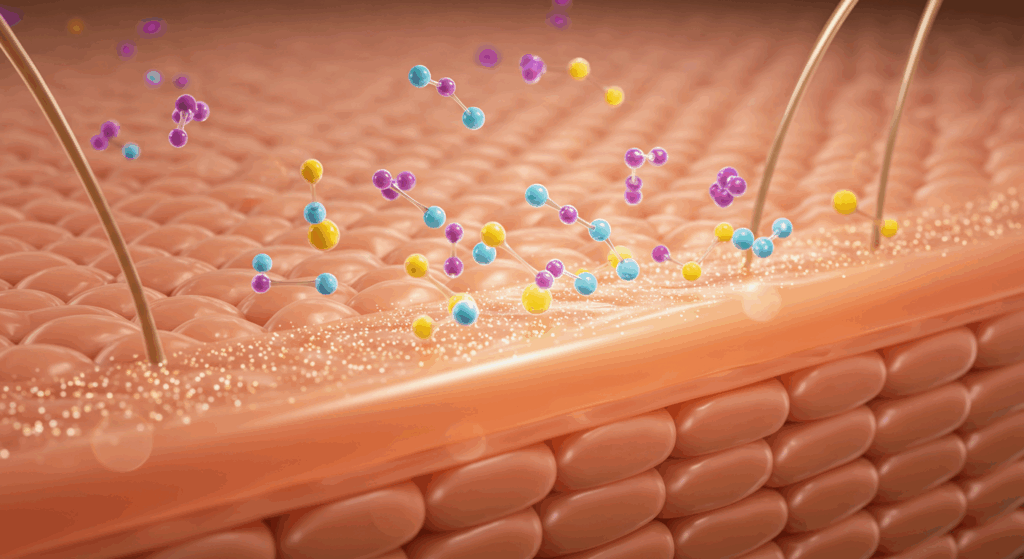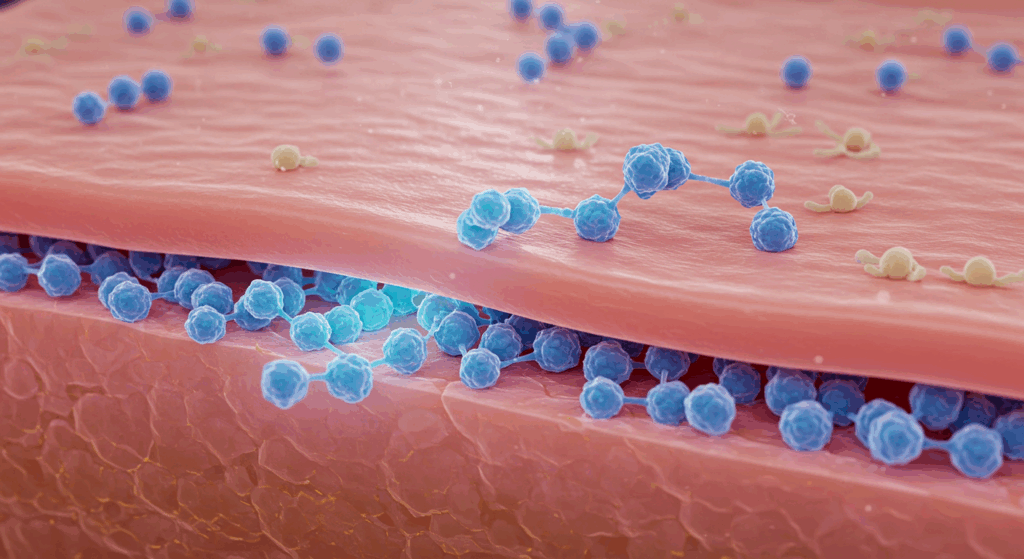تخيل عالمًا حيث تعمل منتجات العناية بالبشرة الخاصة بك على نحو فعال. المستوى الجزيئي، استهداف التجاعيد وحب الشباب وفرط التصبغ مع دقة غير مسبوقةهذا ليس خيالًا علميًا، بل هو حقيقة تقنية النانو في العناية بالبشرة. كـ طبيب امراض جلدية بخبرة تزيد عن عقد من الزمن في ابتكارات العناية بالبشرة المتطورة، شهدتُ بنفسي كيف تُحدث تقنية النانو ثورةً في عالم الجمال. جزيئات بحجم النانو التي تخترق طبقات أعمق من الجلد أنظمة التوصيل الذكية من خلال إطلاق المكونات النشطة بالضبط حيث تكون هناك حاجة إليها، تعمل هذه الابتكارات الدقيقة على إرساء معيار جديد للفعالية والنتائج.
ولكن كيف تعمل تقنية النانو تحديدًا في العناية بالبشرة؟ ما هي... أحدث الاختراقاتوكيف يمكنكِ دمجها في روتينكِ اليومي؟ في هذا الدليل الشامل، سنستكشف علم وفوائد ومستقبل تقنية النانو في العناية بالبشرة، لنضمن لكِ البقاء في طليعة سعيكِ للحصول على بشرة مشرقة وشابة.

العلم وراء تقنية النانو في العناية بالبشرة
ما هي تقنية النانو؟
تتضمن تقنية النانو معالجة المادة في المقياس الذري أو الجزيئي—عادةً ما بين 1 و100 نانومتر. في مجال العناية بالبشرة، هذا يعني إنشاء جزيئات صغيرة جدًا التي تخترق حاجز البشرة بفعالية أكبر من المكونات التقليدية. هذه الجسيمات النانوية قادرة على:
- تعزيز الامتصاص من المكونات النشطة مثل الريتينول وفيتامين سي وحمض الهيالورونيك.
- استهداف مشاكل البشرة المحددة مثل التجاعيد وحب الشباب وفرط التصبغ بدقة.
- تحسين الاستقرار من المركبات غير المستقرة، مما يضمن بقائها فعالة لفترة أطول.
كيف تعمل تقنية النانو في العناية بالبشرة
تركز تقنية النانو في العناية بالبشرة بشكل أساسي على آليتان رئيسيتان:
- التغليف النانوي: المكونات النشطة مغلفة في حاملات بحجم النانو (مثل الليبوزومات أو المستحلبات النانوية) التي تحميها من التحلل وتطلقها تدريجيًا في الجلد. وهذا يضمن فعالية مطولة ويقلل من التهيج.
- الجسيمات النانوية: يتم تقليل المكونات مثل الذهب أو الفضة أو أكسيد الزنك إلى الأحجام النانويةمما يسمح لها بالتغلغل بشكل أعمق في الجلد. على سبيل المثال، الذهب النانوي يتم استخدامه في منتجات مكافحة الشيخوخة لقدرته على تحفيز إنتاج الكولاجين وتحسين المرونة.
تسمح هذه الابتكارات لمنتجات العناية بالبشرة بالعمل أذكى، وليس أصعب، مما يوفر نتائج مرئية بشكل أسرع وأكثر كفاءة من أي وقت مضى.
المكونات الرئيسية لتكنولوجيا النانو في العناية بالبشرة
| المكونات | تطبيقات تكنولوجيا النانو | فوائد |
|---|---|---|
| الريتينول | الريتينول المغلف بالنانو | يقلل من التهيج ويعزز الاختراق ويعزز إنتاج الكولاجين. |
| فيتامين C | فيتامين سي النانوي الليبوزومي | يعمل على تثبيت المكونات، ويمنع الأكسدة، ويضفي إشراقة على البشرة بشكل أكثر فعالية. |
| حمض الهيالورونيك | حمض الهيالورونيك النانوي | يخترق الطبقات العميقة من الجلد لترطيب مكثف وإضفاء مظهر ممتلئ. |
| ذهب | جزيئات الذهب النانوية | يحفز الكولاجين ويقلل الالتهاب ويحسن مرونة الجلد. |
| أكسيد الزنك | أكسيد الزنك النانوي | يوفر حماية واسعة النطاق من الأشعة فوق البنفسجية دون ترك طبقة بيضاء. |
الابتكارات الدقيقة: أحدث الاختراقات في مجال العناية بالبشرة باستخدام تقنية النانو
أنظمة التوصيل الذكية
أحد أكثر التطورات المثيرة في مجال العناية بالبشرة باستخدام تكنولوجيا النانو هو تطوير أنظمة التوصيل الذكية.تستخدم هذه الأنظمة حاملات النانو تستجيب لمحفزات محددة في الجلد، مثل مستويات الحموضة أو نشاط الإنزيمات، لإطلاق المكونات النشطة بدقة حيثما تكون مطلوبة. على سبيل المثال:
- حاملات نانوية حساسة لدرجة الحموضة: قم بإطلاق مكونات مثل حمض الساليسيليك فقط في المناطق ذات المسام المسدودة، مما يجعلها مثالية لعلاج حب الشباب.
- الجسيمات النانوية المحفزة بالإنزيم: يتم تنشيطه في وجود إنزيمات تعمل على تحلل الكولاجين، مما يوفر مكونات مضادة للشيخوخة في المكان الذي تتكون فيه التجاعيد.
تضمن هذه الأنظمة أن المكونات النشطة موجودة تم تسليمها بكفاءة، تقليل النفايات وتعظيم النتائج.
تقنية النانو في واقيات الشمس
غالبًا ما تترك واقيات الشمس التقليدية آثارًا قالب أبيض أو تشعر بالدهون على الجلد. وقد حلت تقنية النانو هذه المشكلة من خلال إدخال مرشحات الأشعة فوق البنفسجية بحجم النانو. على سبيل المثال:
- أكسيد الزنك النانوي وثاني أكسيد التيتانيوم: هذه الجسيمات صغيرة جدًا لدرجة أنها تصبح شفاف عند وضعه على الجلد، يوفر حماية واسعة النطاق بدون بقايا الطباشير.
- أداء مُحسَّن لعامل الحماية من الشمس: تتوزع الجسيمات النانوية بشكل أكثر توازناً على الجلد، مما يخلق طبقة واقية موحدة الذي يمنع أشعة UVA وUVB بشكل أكثر فعالية.
هذا الابتكار مفيد بشكل خاص للأفراد ذوي درجات لون البشرة الداكنة، الذين غالبا ما يعانون من الطبقة البيضاء التي تتركها واقيات الشمس التقليدية.
تقنية النانو لمكافحة الشيخوخة
لقد تم تحويل العناية بالبشرة المضادة للشيخوخة بواسطة تقنية النانو، مع مكونات مثل الببتيدات النانوية و الذهب النانوي يقودون المهمة. إليكم كيفية عملهم:
- الببتيدات النانوية: تتغلغل هذه البروتينات الصغيرة بعمق في الجلد، محفزةً إنتاج الكولاجين والإيلاستين بفعالية أكبر من نظيراتها الأكبر حجمًا. وتُستخدم غالبًا في الأمصال والكريمات لتقليل الخطوط الدقيقة وتحسين تماسك البشرة.
- الذهب النانوي: تشتهر جزيئات الذهب النانوية بـ خصائص مضادة للالتهابات ومضادات الأكسدة. فهي تساعد على تقليل الاحمرار وتحسين ملمس الجلد وتعزيز توهج الشباب.
بالنسبة لأولئك الذين يتطلعون إلى مكافحة علامات الشيخوخة، فإن دمج المنتجات القائمة على تقنية النانو يمكن أن يوفر نتائج أسرع وأكثر وضوحًا.
تقنية النانو في علاج حب الشباب
وقد استفاد علاج حب الشباب أيضًا من تقنية النانو، وخاصة من خلال استخدام نانو فضة و نانو بنزويل بيروكسيدوتقدم هذه الابتكارات:
- نانو الفضة: مضاد حيوي قوي، يستهدف البكتيريا المسببة لحب الشباب دون تهيج البشرة. يُستخدم غالبًا في منظفات البشرة وعلاجات البثور.
- نانو بنزويل بيروكسيد: يقوم بإيصال المكونات النشطة إلى عمق المسام، مما يقلل الالتهاب ويمنع ظهور البثور بشكل أكثر فعالية من التركيبات التقليدية.
بالنسبة للأفراد الذين يعانون من حب الشباب، توفر تقنية النانو حلول أكثر لطفًا وفعالية التي تقلل من الآثار الجانبية مثل الجفاف والتهيج.
فوائد تقنية النانو في العناية بالبشرة
تعزيز الاختراق والامتصاص
من أهم مزايا تقنية النانو في العناية بالبشرة قدرتها على تعزيز الاختراق والامتصاص من المكونات النشطة. غالبًا ما تواجه منتجات العناية بالبشرة التقليدية صعوبة في اختراق حاجز البشرة الواقي، مما يحد من فعاليتها. تتغلب تقنية النانو على هذا التحدي من خلال:
- تقليل جزيئات المكونات إلى الحجم الذي يمكن تمر بسهولة عبر الطبقة القرنية (الطبقة الخارجية من الجلد).
- استخدام الناقلات النانوية لـ نقل المكونات إلى عمق الجلدحيث يمكنهم ممارسة تأثيراتهم بشكل أقوى.
وهذا يؤدي إلى تحسينات أسرع وأكثر وضوحًا في ملمس البشرة وترطيبها ومظهرها العام.
علاج مستهدف لمشاكل جلدية محددة
تسمح تقنية النانو بـ علاجات عالية الاستهداف التي تعالج مشاكل البشرة بدقة. على سبيل المثال:
- فرط التصبغ: يمكن توصيل فيتامين C أو النياسيناميد المغلف بتقنية النانو مباشرة إلى الخلايا المنتجة للميلانين، مما يقلل البقع الداكنة بشكل أكثر فعالية.
- التجاعيد: يمكن للببتيدات النانوية والريتينول النانوي تحفيز إنتاج الكولاجين في المناطق التي تكون هناك حاجة ماسة إليه، مما يساعد على تنعيم الخطوط الدقيقة والتجاعيد.
- حَبُّ الشّبَاب: يستهدف النانو سيلفر والنانو بنزويل بيروكسايد البكتيريا المسببة لحب الشباب في أعماق المسام، مما يمنع ظهور البثور من مصدرها.
يضمن هذا المستوى من الدقة أن تكون العلاجات أكثر فعالية وكفاءة، مما يقلل الحاجة إلى منتجات متعددة.
تحسين استقرار المكونات النشطة
العديد من مكونات العناية بالبشرة، مثل فيتامين سي والريتينول، غير مستقر للغاية ويمكن أن تتحلل عند تعرضها للضوء أو الهواء. تعالج تقنية النانو هذه المشكلة من خلال:
- تغليف المكونات في حاملات نانوية واقية تحميها من العوامل البيئية.
- إطلاق المكونات تدريجيا، مما يضمن بقائها نشطة وفعالة لفترات أطول.
هذا ليس فقط يطيل مدة الصلاحية من منتجات العناية بالبشرة، ولكنه يضمن أيضًا حصولك على المزايا الكاملة من المكونات النشطة مع كل استخدام.
تقليل التهيج والآثار الجانبية
قد تُسبب منتجات العناية بالبشرة التقليدية تهيجًا في بعض الأحيان، خاصةً لأصحاب البشرة الحساسة. تُساعد تقنية النانو على تخفيف هذا التهيج من خلال:
- توصيل المكونات بجرعات خاضعة للرقابة- تقليل خطر التحميل الزائد على الجلد.
- استهداف مناطق محددة دون التأثير على الجلد المحيط، مما يقلل من الاحمرار والالتهاب.
وهذا يجعل منتجات العناية بالبشرة تعتمد على تقنية النانو مثالي لأنواع البشرة الحساسة، مما يوفر نتائج قوية دون الآثار الجانبية غير المرغوب فيها.
المخاطر والاعتبارات المحتملة
المخاوف المتعلقة بالسلامة
على الرغم من أن تقنية النانو في العناية بالبشرة تقدم فوائد عديدة، فمن المهم أن نأخذ في الاعتبار المخاطر المحتملة. حجم صغير من الجسيمات النانوية يسمح لها بالتغلغل أعمق في الجلد، مما يثير تساؤلات حول آثارها طويلة المدى. من بين هذه المخاوف:
- اضطراب حاجز الجلد: الإفراط في استخدام المنتجات المعتمدة على تقنية النانو قد يؤدي إلى الإضرار بوظيفة الحاجز الطبيعي للبشرة.
- الامتصاص الجهازي: هناك أبحاث جارية حول ما إذا كانت الجسيمات النانوية قادرة على دخول مجرى الدم والتراكم في الأعضاء، على الرغم من أن الأدلة الحالية تشير إلى أن هذا غير مرجح مع التطبيقات الموضعية.
لتخفيف هذه المخاطر، من المهم أن:
- اختر المنتجات من العلامات التجارية ذات السمعة الطيبة التي تجري اختبارات السلامة الشاملة.
- اتبع تعليمات الاستخدام بعناية وتجنب الإفراط في استخدام المنتجات المعتمدة على تقنية النانو.
المشهد التنظيمي
لا تزال البيئة التنظيمية لتكنولوجيا النانو في مجال العناية بالبشرة في طور التطور. الاتحاد الأوروبيتخضع الجسيمات النانوية في مستحضرات التجميل لتقييمات سلامة صارمة بموجب لائحة مستحضرات التجميل (EC) رقم 1223/2009. في الولايات المتحدة الأمريكيةوتقوم إدارة الغذاء والدواء بمراقبة استخدام الجسيمات النانوية في مستحضرات التجميل، لكنها لا تملك لوائح محددة حتى الآن.
كمستهلك، ابحث عن المنتجات التي:
- نكون مُسمّى بشكل شفاف مع معلومات حول محتوى الجسيمات النانوية.
- لقد خضعت اختبارات السلامة الصارمة ويتم اعتمادها من قبل الهيئات التنظيمية.
التأثير البيئي
التأثير البيئي للجسيمات النانوية هو اعتبار آخر. بعض الجسيمات النانوية، مثل نانو فضة و أكسيد الزنك النانويوُجد أن هذه المواد تتراكم في أنظمة المياه، مما قد يُلحق الضرر بالحياة المائية. للحد من التأثير البيئي:
- اختر العلامات التجارية التي تستخدم حاملات نانوية قابلة للتحلل الحيوي أو تركيبات صديقة للبيئة.
- تخلص من منتجات العناية بالبشرة بطريقة مسؤولة، مع اتباع الإرشادات المحلية الخاصة بالنفايات التجميلية.

كيفية دمج تقنية النانو للعناية بالبشرة في روتينك
اختيار المنتجات المناسبة
عند اختيار منتجات العناية بالبشرة المعتمدة على تقنية النانو، ضع ما يلي في الاعتبار:
- نوع بشرتك ومشاكلك: ابحث عن المنتجات المصممة خصيصًا لتلبية احتياجاتك المحددة، سواء كانت منتجات مضادة للشيخوخة، أو علاج حب الشباب، أو الترطيب.
- شفافية المكونات: اختر العلامات التجارية التي تسرد بوضوح مكونات الجسيمات النانوية وأغراضها.
- السلامة والفعالية: اختاري المنتجات التي تم اختبارها سريريًا واعتمادها من قبل أطباء الجلد.
على سبيل المثال، إذا كنت تبحث عن عنوان التجاعيد والخطوط الدقيقة، مصل يحتوي على الببتيدات النانوية أو نانو ريتينول سيكون خيارًا ممتازًا. البشرة المعرضة لحب الشباب، فكر في استخدام منظف أو علاج باستخدام نانو فضة أو نانو بنزويل بيروكسيد.
تكامل الروتين خطوة بخطوة
إليك كيفية دمج العناية بالبشرة باستخدام تقنية النانو في روتينك اليومي:
- روتين الصباح:
- منظف: استخدمي منظفًا لطيفًا مع نانو فضة لإزالة الشوائب والبكتيريا.
- المصل: تطبيق مصل فيتامين سي النانوي لتفتيح البشرة وحمايتها من أضرار البيئة.
- مرطب: اتبع ذلك باستخدام مرطب يحتوي على حمض الهيالورونيك النانوي لترطيب عميق.
- واقي الشمس: إنتهي بـ واقي الشمس من أكسيد الزنك النانوي للحصول على حماية واسعة النطاق من الأشعة فوق البنفسجية دون ترك طبقة بيضاء.
- روتين المساء:
- التنظيف المزدوج: ابدأ باستخدام منظف قائم على الزيت متبوعًا بـ منظف حمض الساليسيليك النانوي لتفتيح المسام.
- علاج: تطبيق مصل الريتينول النانوي أو الببتيد النانوي لتحفيز إنتاج الكولاجين طوال الليل.
- مرطب: استخدمي مرطبًا غنيًا بـ السيراميدات النانوية لإصلاح حاجز الجلد.
يضمن لك هذا الروتين تحقيق أقصى استفادة من تقنية النانو مع الحفاظ على بشرتك صحية ومتوازنة.
دمج تقنية النانو مع العلاجات الأخرى
يمكن دمج العناية بالبشرة بتقنية النانو مع علاجات أخرى لتحسين النتائج. على سبيل المثال:
- الوخز بالإبر الدقيقة: يُمكن أن يُعزز دمج سيرومات النانو مع الوخز بالإبر الدقيقة امتصاص المكونات النشطة. تعرّف على المزيد حول الوخز بالإبر الدقيقة مقابل الميزوثيرابي لتحديد العلاج المناسب لك.
- العلاج بالضوء LED: يمكن أن يؤدي استخدام الأمصال النانوية بعد العلاج بالضوء LED إلى تعزيز إنتاج الكولاجين وتقليل الالتهاب.
- التقشير الكيميائي: يمكن أن يساعد استخدام حمض الهيالورونيك النانوي أو الببتيدات النانوية بعد التقشير على تهدئة البشرة وتسريع عملية الشفاء.
استشيري دائمًا طبيب الأمراض الجلدية قبل الجمع بين العلاجات للتأكد من أنها مناسبة لنوع بشرتك ومشاكلك.
الاتجاهات المستقبلية في العناية بالبشرة باستخدام تقنية النانو
العناية بالبشرة الشخصية
مستقبل تقنية النانو في العناية بالبشرة يكمن في التخصيصتُمهّد التطورات في الذكاء الاصطناعي والتكنولوجيا الحيوية الطريق لمنتجات للعناية بالبشرة مُصمّمة خصيصًا لتناسب ميكروبيوم البشرة الفريد وتركيبها الجيني. تخيّل مرطبًا يتكيّف مع احتياجات بشرتك فورًا، فيُطلق الترطيب عندما تكون جافة أو يُهدّئها عندما تكون مُلتهبة. سيُحدث هذا المستوى من التخصيص ثورةً في طريقة تعاملنا مع العناية بالبشرة، مما يجعل العلاجات أكثر فعالية وكفاءة.
أجهزة العناية بالبشرة الذكية
هناك اتجاه مثير آخر يتمثل في دمج تكنولوجيا النانو مع أجهزة العناية بالبشرة الذكية. على سبيل المثال:
- أنظمة توصيل الرقع النانوية: تستخدم هذه اللاصقات إبرًا دقيقة مُشبعة بمكونات نانوية لتوصيل المركبات الفعالة مباشرةً إلى الجلد. وهي غير مؤلمة وسهلة الاستخدام وفعالة للغاية في علاجات مُحددة مثل تقليل التجاعيد أو علاج حب الشباب الموضعي.
- أجهزة استشعار العناية بالبشرة القابلة للارتداء: تراقب هذه الأجهزة حالات الجلد في الوقت الفعلي وتطلق مكونات نانوية حسب الحاجة، مما يوفر حلول للعناية بالبشرة عند الطلب.
هذه الابتكارات سوف تجعل العناية بالبشرة أكثر مريحة وشخصية من أي وقت مضى.
تكنولوجيا النانو المستدامة
مع توجه صناعة التجميل نحو الاستدامة، تتطور تقنية النانو أيضًا لتصبح أكثر مراعاةً للبيئة. ويعمل الباحثون على تطوير حاملات نانوية قابلة للتحلل الحيوي تتحلل بشكل غير ضار في البيئة، مما يقلل من البصمة البيئية لمنتجات العناية بالبشرة. بالإضافة إلى ذلك، الجسيمات النانوية النباتية يتم استكشاف المواد المشتقة من المصادر الطبيعية كبدائل للمواد الاصطناعية.
ويضمن هذا التحول نحو الاستدامة إمكانية التمتع بفوائد التكنولوجيا النانوية دون المساس بصحة كوكبنا.

الخلاصة: مستقبل العناية بالبشرة هو النانو
النقاط الرئيسية
- تعمل تقنية النانو على تعزيز فعالية العناية بالبشرة من خلال تحسين امتصاص المكونات واستقرارها وتوصيلها إلى الهدف.
- إنجازات مثل التغليف النانوي وأنظمة التوصيل الذكية يضعون معايير جديدة لمكافحة الشيخوخة وعلاج حب الشباب والحماية من الشمس.
- السلامة والاستدامة تعتبر الاعتبارات الحاسمة عند اختيار المنتجات المعتمدة على تقنية النانو.
- مستقبل العناية بالبشرة يكمن في التخصيص والأجهزة الذكية، مع وجود تكنولوجيا النانو في طليعة هذه الابتكارات.
الخطوات التالية
هل أنت مستعد لتجربة فوائد تقنية النانو في العناية بالبشرة؟ ابدأ بـ:
- تقييم مشاكل بشرتك وتحديد مكونات تكنولوجيا النانو التي يمكنها معالجة هذه المشاكل.
- البحث عن العلامات التجارية ذات السمعة الطيبة التي تعطي الأولوية للسلامة والفعالية والشفافية في تركيباتها.
- استشارة طبيب الأمراض الجلدية إنشاء روتين للعناية بالبشرة مخصص يتضمن تقنية النانو.
- استكشاف العلاجات التكميلية مثل الوخز بالإبر الدقيقة أو العلاج بالضوء LED لتحسين النتائج.
لمزيد من المعلومات حول علاجات العناية بالبشرة المتقدمة، راجع أدلةنا على العناية بالبشرة الصديقة للميكروبيوم و الميزوثيرابي.
الأسئلة الشائعة
ما هي تقنية النانو في العناية بالبشرة؟
تتضمن تقنية النانو في العناية بالبشرة استخدام جزيئات صغيرة جدًا (جسيمات نانوية) لتعزيز توصيل المكونات النشطة وامتصاصها وفعاليتها. تستطيع هذه الجسيمات اختراق طبقات الجلد بعمق، مما يوفر علاجات مُستهدفة لمشاكل مثل الشيخوخة وحب الشباب وفرط التصبغ.
هل استخدام تقنية النانو في العناية بالبشرة آمن؟
عند استخدامها بمسؤولية، تُعتبر تقنية النانو في العناية بالبشرة آمنة. تُجري العلامات التجارية المرموقة اختبارات صارمة لضمان جودة منتجاتها. غير سامة وفعالةومع ذلك، فمن الضروري اختيار المنتجات من مصادر موثوقة واتباع تعليمات الاستخدام بعناية.
كيف تعمل تقنية النانو على تحسين الحماية من الشمس؟
تعمل تقنية النانو على تحسين الحماية من أشعة الشمس عن طريق تقليل مرشحات الأشعة فوق البنفسجية مثل أكسيد الزنك وثاني أكسيد التيتانيوم الأحجام النانوية. وهذا يجعلهم شفاف على الجلد أثناء توفير حماية واسعة النطاق بدون الطبقة البيضاء المرتبطة بمستحضرات الوقاية من الشمس التقليدية.
هل يمكن أن تساعد تقنية النانو في علاج حب الشباب؟
نعم! يمكن لتقنية النانو أن تُحسّن علاج حب الشباب بشكل ملحوظ من خلال توفير مكونات فعالة مثل حمض الساليسيليك وبنزويل بيروكسايد عميقًا في المسام. نانو فضة ويستخدم أيضًا لخصائصه المضادة للبكتيريا، مما يساعد على تقليل ظهور البثور والالتهابات.
ما هي أفضل منتجات العناية بالبشرة بتقنية النانو؟
أفضل منتجات العناية بالبشرة بتقنية النانو تعتمد على احتياجاتك الخاصة. ابحثي عن سيروم يحتوي على الببتيدات النانوية لمكافحة الشيخوخة، المنظفات مع نانو فضة لعلاج حب الشباب، وكريمات الوقاية من الشمس أكسيد الزنك النانوي للحماية من الأشعة فوق البنفسجية. اختر دائمًا منتجات من علامات تجارية موثوقة تُولي الأولوية للسلامة والفعالية.
كيف أدمج تقنية النانو في روتين العناية بالبشرة الخاص بي؟
ابدأ بتحديد مشاكل بشرتك واختر منتجات بمكونات نانوية مصممة خصيصًا لتلبية احتياجاتها. على سبيل المثال، استخدم مصل فيتامين سي النانوي في الصباح و علاج الريتينول النانوي في الليل. اتبع دائمًا تعليمات المنتج واستشر طبيب أمراض جلدية إذا لم تكن متأكدًا.
هل هناك أي آثار جانبية لتقنية النانو في العناية بالبشرة؟
في حين أن تقنية النانو آمنة بشكل عام، إلا أن بعض الأفراد قد يتعرضون لخطر تهيج خفيف إذا كانت بشرتك حساسة. لتقليل المخاطر، اختبر المنتجات الجديدة على منطقة صغيرة من بشرتك وأدخلها تدريجيًا في روتينك. تجنب الإفراط في استخدام المنتجات القائمة على تقنية النانو لتجنب أي خلل محتمل في حاجز البشرة.
ما هو مستقبل تقنية النانو في العناية بالبشرة؟
مستقبل تقنية النانو في العناية بالبشرة واعدٌ للغاية. نتوقع رؤية المزيد حلول العناية بالبشرة الشخصية, أنظمة التوصيل الذكيةو حاملات نانوية مستدامة تتكيف مع احتياجات البشرة الفردية مع تقليل التأثير البيئي. سيعزز دمج الذكاء الاصطناعي والتكنولوجيا القابلة للارتداء فعالية وراحة العلاجات القائمة على تقنية النانو.
اكتشف خبرة الدكتورة إبرو أوكياي، طبيبتك الموثوقة طبيب امراض جلدية في أنطالياسواء كنت تبحث عن علاج مشاكل البشرة الطبية أو تعزيز جمالك الطبيعي بالعلاجات التجميلية، فإن الدكتور أوكياي هنا لمساعدتك. بفضل الرعاية الشخصية والتقنيات المتقدمة، لم يكن تحقيق أهداف بشرتك أسهل من أي وقت مضى.
